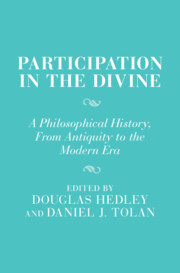Book contents
- Participation in the Divine
- Cambridge Studies in Religion and Platonism
- Participation in the Divine
- Copyright page
- Contents
- Contributors
- Foreword
- Acknowledgements
- Introduction
- 1 The Lord Is One
- 2 The Place and Scope of Participation in the Divine in the Thought of Plato
- 3 Origen on Participation
- 4 Forms, Intellects, and Angels
- 5 Participation in the Divine in Gregory of Nyssa
- 6 Augustine’s “Illumination” Theory as the Natural Participation of the Human Mind
- 7 The Principle of Cosmic Unification in the Athenian School of Platonism
- 8 St. Maximus the Confessor on Participation
- 9 Participation in Medieval Platonism
- 10 Participation as God’s Indwelling
- 11 Some Late Medieval Discussions of Participation in the Divine
- 12 Music, Temperance, and Participation in Marsilio Ficino
- 13 Richard Hooker’s Metaphysics of Divine Participation
- 14 The Transcendence of Holiness
- 15 Ralph Cudworth on Causality and Substantial Forms
- 16 The Romantic Legacy
- 17 Participation Revived and Revised
- Index
- References
16 - The Romantic Legacy
Participation as Reciprocity
Published online by Cambridge University Press: 23 November 2024
- Participation in the Divine
- Cambridge Studies in Religion and Platonism
- Participation in the Divine
- Copyright page
- Contents
- Contributors
- Foreword
- Acknowledgements
- Introduction
- 1 The Lord Is One
- 2 The Place and Scope of Participation in the Divine in the Thought of Plato
- 3 Origen on Participation
- 4 Forms, Intellects, and Angels
- 5 Participation in the Divine in Gregory of Nyssa
- 6 Augustine’s “Illumination” Theory as the Natural Participation of the Human Mind
- 7 The Principle of Cosmic Unification in the Athenian School of Platonism
- 8 St. Maximus the Confessor on Participation
- 9 Participation in Medieval Platonism
- 10 Participation as God’s Indwelling
- 11 Some Late Medieval Discussions of Participation in the Divine
- 12 Music, Temperance, and Participation in Marsilio Ficino
- 13 Richard Hooker’s Metaphysics of Divine Participation
- 14 The Transcendence of Holiness
- 15 Ralph Cudworth on Causality and Substantial Forms
- 16 The Romantic Legacy
- 17 Participation Revived and Revised
- Index
- References
Summary
The dreamlike mood dramatically invoked by Wordsworth in ‘Lines written a few miles above Tintern Abbey’ is the contemplation of the intelligible universe by the ascent of the soul as nous eron, fuelled by joy. Such a philosophical, poetic and sacred enterprise is evidently indebted to the Platonic vision. The Platonic inheritance of Wordsworth or Baudelaire requires scant justification. Yet if one looks at the terminology of the philosophers, it might be inferred that the concept of ‘participation’ had already disappeared drastically from the Western philosophical canon. A cursory glance through the indices of some of the major works of philosophy in the last century will fail to produce many instances of the term.
- Type
- Chapter
- Information
- Participation in the DivineA Philosophical History, From Antiquity to the Modern Era, pp. 343 - 363Publisher: Cambridge University PressPrint publication year: 2024

